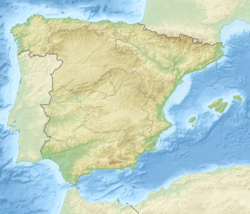The Piedrahita de Muñó Formation is an Early Cretaceous geologic formation of the Cameros Basin in northern Spain.[1] Fossil theropod tracks have been reported from the formation.[2] Also fossils of Lepidotes sp., Polacanthus sp. and Testudines indet. were found in the formation.[1]
| Piedrahita de Muñó Formation | |
|---|---|
| Stratigraphic range: Late Berriasian-mid-Valanginian ~ | |
| Type | Geological formation |
| Unit of | Pedroso/Urbión Group |
| Underlies | Hortigüela Formation |
| Overlies | hiatus with Villar del Arzobispo Formation |
| Lithology | |
| Primary | Sandstone |
| Location | |
| Coordinates | 42°00′N 3°12′W / 42.0°N 3.2°W |
| Approximate paleocoordinates | 33°06′N 7°42′E / 33.1°N 7.7°E |
| Region | Burgos Province, Castile and León |
| Country | |
| Extent | Cameros Basin |
| Type section | |
| Named for | Piedrahita de Muñó |
Correlation
edit
See also
editReferences
edit- ^ a b Piedrahita de Muñó Formation at Fossilworks.org
- ^ Weishampel et al., 2004, pp. 517-607
Bibliography
edit- Weishampel, David B.; Dodson, Peter; Osmólska, Halszka (2004), The Dinosauria, 2nd edition, Berkeley: University of California Press, pp. 1–880, ISBN 0-520-24209-2, retrieved 2019-02-21
Further reading
edit- X. Pereda Suberbiola, M. Meijide, F. Torcida, J. Welle, C. Fuentes, L. A. Izquierdo, D. Montero, G. Pérez, and V. Urién. 1999. Espinas dermicas del dinosaurio anquilosaurio Polacanthus en las facies Weald de Salas de los Infantes (Burgos, España) [Dermal spines of the ankylosaurian dinosaur Polacanthus in the Weald facies of Salas de los Infantes (Burgos, Spain)]. Estudios Geológicos 55:267-272
- Platt, N.H.; Meyer, C.A. (1991), "Dinosaur footprints from the Lower Cretaceous of northern Spain: their sedimentological and palaeoecological context", Palaeogeography, Palaeoclimatology, Palaeoecology, 86 (3–4): 321–333, Bibcode:1991PPP....85..321P, doi:10.1016/0031-0182(91)90165-N

